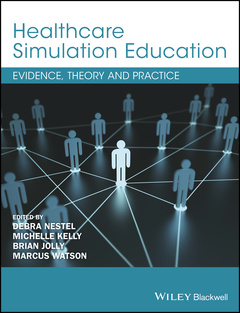Healthcare Simulation Education Evidence, Theory and Practice
Coordonnateurs : Nestel Debra, Kelly Michelle, Jolly Brian, Watson Marcus

Written by a leading team from the Australian Society for Simulation in Healthcare (ASSH), Simulation Australasia, Healthcare Simulation Education is a new resource for a rapidly expanding professional healthcare simulation community. Designed as a core reference for educators who use simulation as an educational method, it outlines theory, evidence and research relevant to healthcare simulation. Containing examples of innovations from around the world, the book offers opportunities to make clear connections between the underlying rationale for the use of simulation, and what this looks like in practice.
Healthcare Simulation Education:
- Helps readers gain a systematic understanding of theory and application of simulation
- Facilitates access to high quality resources to support healthcare simulation education and research
- Edited by a leading team from the Australian Society for Simulation in Healthcare (ASSH), the leading body for healthcare simulation in Australia
- Contains information on educational theory, the elements of simulation practice and contemporary issues in simulation
An important text in healthcare literature and practice, Healthcare Simulation Education provides a unique cross-disciplinary overview of an innovative subject area, and is ideal for medical, nursing and allied health educators, policy makers and researchers.
Contributors, ix
Foreword, xiii
Acknowledgements, xv
Section I: Introduction
1 An introduction to healthcare simulation, 3
Debra Nestel & Michelle Kelly
Section II: Theoretical perspectives and frameworks for healthcare simulation
2 Theories informing healthcare simulation practice, 9
Margaret Bearman, Debra Nestel & Nancy McNaughton
3 Historical practices in healthcare simulation: What we still have to learn, 16
Harry Owen
4 Exploring realism in healthcare simulations, 23
Debra Nestel, Kristian Krogh & Michaela Kolbe
5 Applying a framework to healthcare simulation: Micro, meso and macro levels, 29
Marcus Watson
Section III: Contemporary issues in healthcare simulation
6 Strategies for research in healthcare simulation, 37
Debra Nestel & Michelle Kelly
7 Simulated participant methodologies: Maintaining humanism in practice, 45
Debra Nestel, Jill Sanko & Nancy McNaughton
8 Narrative dramaturgy and sense making in healthcare simulation, 54
Teresa Crea
9 Haptics-driven healthcare training simulator systems, 60
Lei Wei, Hailing Zhou, Matthew Watson, Zoran Najdovski, Mick Fielding, Richard Page & Saeid Nahavandi
10 Virtual environments and virtual patients in healthcare, 69
LeRoy Heinrichs, Parvati Dev & Dick Davies
11 Consistency in simulation: A measurement perspective, 80
Brian Jolly
12 Taking simulation beyond education in healthcare, 86
Marcus Watson
13 The value of professional societies to the healthcare simulation community of practice, 90
Pamela B. Andreatta, Kirsty J. Freeman & Ralph J. MacKinnon
14 Faculty development in healthcare simulation, 105
Simon Edgar, Michael Moneypenny & Alistair May
15 Programme development and sustainability in healthcare simulation, 112
Komal Bajaj, Michael Meguerdichian, Jessica Pohlman & Katie Walker
Section IV: Elements of simulation practice
16 Ethics of healthcare simulation, 121
Nathan Emmerich, Gerard Gormley & Melissa McCullough
17 Teamwork and healthcare simulation, 127
Jenny Weller & Ian Civil
18 Designing simulation-based learning activities: A systematic approach, 135
Debra Nestel & Suzanne Gough
19 Facilitating healthcare simulations, 143
Michelle Kelly & Stephen Guinea
20 Strategies for managing adverse events in healthcare simulations, 152
Stuart Marshall & Cate McIntosh
21 Debriefing: The state of the art and science in healthcare simulation, 158
Adam Cheng, Walter Eppich, Taylor Sawyer & Vincent Grant
Section V: Innovations in healthcare simulation practice
22 Simulation of home births: Developing safe practices, 167
Arunaz Kumar & Debra Nestel
23 Optimizing learning in simulation-based education using video-reflexivity, 171
Suzanne Gough
24 Conversations about organ and tissue donation: The role of simulation, 176
Jonathan Gatward, Leigh McKay & Michelle Kelly
25 Commencing a simulation-based curriculum in a medical school in China: Independence and integration, 181
Fei Han
26 Transport of the critically ill patient: Developing safe practices, 185
Rafidah Atan, Kristian Krogh, Nor’azim Mohd Yunos, Suneet Sood, Naganathan & Debra Nestel
27 From routine to leadership: Extending the role of simulation technicians in Southeast Asia, 190
Bee Leng Sabrina Koh & Chaoyan Dong
28 Incorporating simulation in a medical city: A case study from King Fahad Medical City, 195
Hani Lababidi
29 ‘Who‘ and ‘how‘ in simulation centre development: Buddies and ground rules, 200
Eric So, George Ng & LY Ho
30 Operationalizing a new emergency department: The role of simulation, 205
Mike Eddie, Carrie Hamilton, Owen Hammett, Phil Hyde, Kate Pryde & Kim Sykes
31 Simulation modelling and analysis to test health systems, 209
Kenny Macleod & Robert Moody
Section VI: Conclusions and future practice
32 Twenty years on… forecasting healthcare simulation practices, 217
Debra Nestel & Michelle Kelly
Index, 221
Professor Debra Nestel, Professor of Simulation Education in Healthcare, School of Rural Health, Monash University, Australia (Chair, Australian Society for Simulation in Healthcare (ASSH)).
Ms Michelle Kelly (Chair Elect, ASSH), Director of Simulation and Technologies at the Faculty of Health, University of Technology, Sydney, Australia.
Professor Brian Jolly (Immediate Past Chair, ASSH), Professor of Medical Education, University of Newcastle, Australia.
Associate Professor Marcus Watson (Past Chair, ASSH), Executive Director of the Clinical Skills Development Service and Associate Professor of Medical Education, School of Medicine and Honorary Associate Professor, School of Psychology, University of Queensland, Australia.
Date de parution : 05-2017
Ouvrage de 256 p.
18.8x24.4 cm



